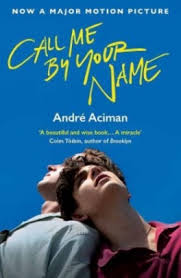André Aciman
Picador

|
“Right now you may not want to feel anything…If there is pain, nurse it, and if there is a flame, don’t snuff it out, don’t be brutal with it. Withdrawal can be a terrible thing when it keeps us awake at night, and watching others forget us sooner than we’d want to be forgotten is no better. We rip out so much of ourselves to be cured of things faster than we should that we go bankrupt by the age of thirty and have less to offer each time we start with someone new. But to feel nothing so as not to feel anything—what a waste!” from Call Me by Your Name |
The universal yet uniquely personal experience of falling in love.
Published in 2007, André Aciman’s Call Me by Your Name captures both the exhilaration and the terror of a young person falling in love for the first time. The book was recently translated into Luca Guadagnino’s lush and sensuous film of the same title, winning this year’s Academy Award for Best Adapted Screenplay (by James Ivory of Ivory and Merchant fame.)
Elio is a precocious seventeen-year-old living with his professor father and mother in northern Italy when Oliver, a twenty-four-year old American graduate student, comes to stay with them for six weeks during the summer of 1982. Elio’s awakening desires, fears, and feints of attraction-repulsion will be recognizable to many who remember their own experience of First Love, that sense of opening oneself up to another person so totally, so nakedly.
Stories of First Love are both universal and, at the same time, uniquely personal. They may differ in the details, but the psychological upheavals—one moment soaring to the heights of ecstasy, the next plunging to the depths of despair—the desires, the deliriums, the sense of danger, all are a common report among those who survived.
In beautiful, insightful language, Aciman expresses the intoxicating, dizzying first hit of infatuation, that burst of desire followed by its instant antidote, fear. “I was afraid when he showed up, afraid when he failed to, afraid when he looked at me, more frightened yet when he didn’t.” Elio comes to realize the power the beloved holds over the lover: “if one word from him could make me so happy, another could just as easily crush me.”
He is swept along on powerful currents of emotion, overwhelmed by strong often contradictory feelings at war with each other on the battlefield of his heart. Sensing Elio’s turmoil, his father offers, “You can always talk to me. I was your age once…The things you feel and think only you have felt, believe me, I’ve lived and suffered through all of them, and more than once—some I’ve never gotten over and others I’m as ignorant about as you are today, yet I know almost every bend, every tollbooth, every chamber in the human heart.” All true. But the young person still needs to experience it for him- or herself.
Like many before him, Elio will discover that First Love often ends in First Loss, and, like other major life events, it leaves scars; the difference is that with time, we come to love those scars.
This review first appeared in The Columbia River Reader (April 15-May 14, 2018.) Reprinted with permission.



